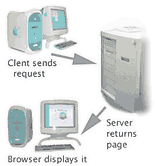
Our model for the Web transaction by which we get a file is:
- We request a document, say
http://howard.nebrwesleyan.edu/index.html,
which request is sent to a server, and
- The server sends it back to our computer, at which point
- The Web browser we're using (Netscape or Internet
Explorer) displays it for us to see.
Suppose we do something a little more interesting: for example,
suppose we are confronted by a Form, like the following:
In this case, when we press Submit button (the one labeled
"log in"), we continue the transaction shown above. (Actually, we
don't: this particular form does absolutely nothing. But, with a
little imagination, we could conceive that it might...)
- Our Web browser sends the information in
the form back to the server,
- the server does something with it
(there's a computer program hiding behind this, really),
- and then it sends a new page back to
our browser,
- which displays it just like before.
This type of transaction is server-side form
processing, and requires that we have some program on the
server to do the something. You will also hear that it uses
CGI -- the "Common
Gateway Interface" for the
transaction.
Ok, what about the following form elements?
These are both done with client-side forms, in
particular, code written in javascript. Javascript, along
with the completely unrelated but very confusingly named
java, as well as other completely unrelated but less
confusingly named shockwave and other "plug-ins", allow us to
make Web pages interactive. What does this mean? It means a
transaction model:
- We interact with the Web page, and
- our browser interprets what we've done based on
information in the Web page, and reacts accordingly.
- For normal text, image, movie, etc. files, our
transaction model is
request ->
server response ->
browser display.
- When we have a server-side form, the model is
request ->
server response ->
browser display ->
browser response ->
server process and reply ->
browser display.
- When we have a client-side processing, the model is
request ->
server response ->
browser display ->
user input ->
browser process ->
browser redisplay.
|
|
Gavin's HHMI 02 Web Workshop: Web Info 3
Last Modified: Thu May 30 12:51:38 EDT 2002
Comments to
glarose@umich.edu
©2002 Gavin LaRose, UM Math
Dept
 More TRANSACTIONS
More TRANSACTIONS
 More TRANSACTIONS
More TRANSACTIONS